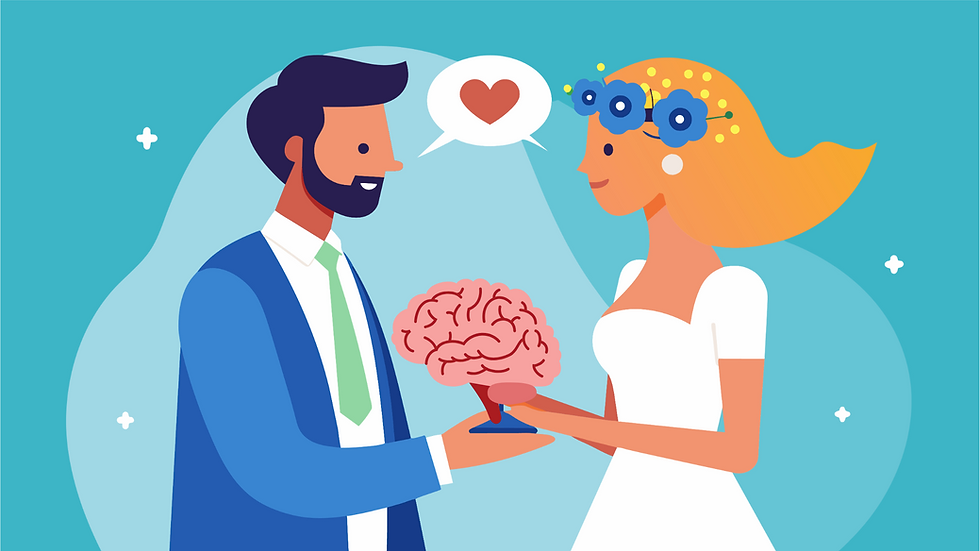Finding Certainty in Uncertain Times: A Guide to Mental Health
- MHAI
- Apr 25, 2025
- 3 min read
Updated: May 15, 2025
There is a reason that we feel better when we can name something. Many sick individuals report that simply finding out what is wrong helps them cope better.
The process of demystification is powerful. It gives us a sense of control. To confront something, you first need to understand what it is. Conversely, uncertainty can lead to or worsen feelings of stress, anxiety, or other mental health issues.
Uncertainty and Mental Health
This is an area of mental health that we all instinctively understand. Yet, it hasn't undergone extensive academic research. There has been increased interest in the wake of the COVID-19 pandemic. Widespread uncertainty at national and international levels has harmed many people's mental health.
As one paper points out, “no comprehensive review on the association between uncertainty and mental health exists.” The authors looked at the available literature and concluded that “79% reported a positive association between uncertainty and mental health problems.”
Generally, uncertainty isn’t the direct source of mental health issues. Instead, it exacerbates existing problems.
Finding Certainty in Uncertainty
We are living through uncertain times. Sweeping changes in the fabric of the American landscape disrupt the status quo. This will likely impact individuals already battling mental health issues.
However, there is a way forward. If you notice a family member struggling more than usual, you can step in to provide support. As one report states, “support from family has the potential to alleviate uncertain feelings and reduce perceived stress.”
While you may not control external circumstances, talking about these issues helps trigger the process of demystification. Open communication can encourage your loved one to seek help.
It may sound simple, but this is the most crucial step. Lack of communication allows fear to thrive, so discussing the problems your loved one faces is vital.

The 5 C’s of Mental Health: Tools for Everyone
But what if you start feeling your mental health decline? If feelings of uncertainty plague you, there are steps you can take to help yourself. Seeking professional help is essential, but self-initiated action is equally important.
The simplest answer is always to talk. Talk to friends and family. Reach out to neighbors or anyone you think will understand. The act of communication greatly dispels uncertainty and helps you feel more in control.
Additionally, there are other strategies you can explore to build resilience. One effective framework is called “The 5 C’s of Mental Health.”
Coping
Coping refers to the strategies and skills people can employ to manage daily stress and challenges. Effective coping strategies reduce stress, enhance problem-solving abilities, and help you better control your emotions.
Some common tactics include keeping a journal, practicing yoga, or deep breathing exercises. Embrace hobbies that uplift you. Take time to identify what works best for you.
Compassion
Compassion is both an innate feeling and a skill we can develop. It involves kindness towards others and can also be directed towards ourselves. While some may readily help friends or strangers, they can be highly critical of themselves.
For some, learning compassion means adhering to the adage, “treat others as you would like to be treated.” For others, it involves treating themselves with the same kindness.
Embracing compassion can foster empathy and contribute to a more positive outlook on daily life.
Connection
Compassion greatly links to connection, emphasizing our relationships with family, friends, and colleagues. We are inherently social creatures requiring frequent positive interactions with those around us.
But connections don't occur by accident. Make an effort to connect with others. Schedule time for friends and family. Join groups or clubs, or engage in activities that excite you.
Community
Connection on a larger scale constitutes community. A strong social network offers a sense of belonging while providing invaluable support. Unfortunately, many people, particularly in urban environments, are increasingly disconnected from their communities.
Creating opportunities for interaction takes effort. Whether online or in person, striving to be part of a community where you contribute and receive support is powerful.
Care
Care encompasses proactive steps to improve and maintain mental health. Various self-care options can indeed transform your life. These may include exercise, proper nutrition, adequate sleep, and engaging in enjoyable hobbies.
If you (or a loved one) find that nothing seems to help, it's crucial to reach out for professional help. If you're uncertain where to begin, contact us at MHAI for guidance.
Prioritizing Mental Health
With so much uncertainty today, people suffer as a result. If you're at risk, taking steps to strengthen your mental health will better equip you to face the future.
Now, more than ever, it's essential to look out for yourself and your loved ones. Communicating openly and frequently is paramount; this is our strongest weapon against uncertainty.




Comments